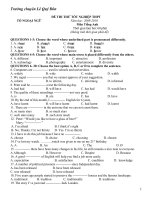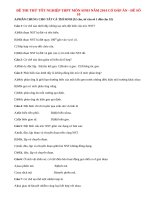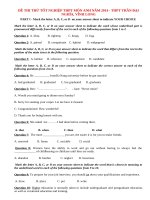Đề thi thử tốt nghiệp THPT môn Anh có đáp án năm 2014 (P3)
Bạn đang xem bản rút gọn của tài liệu. Xem và tải ngay bản đầy đủ của tài liệu tại đây (119.27 KB, 6 trang )
A.
PHẦN TRẮC NGHIỆM :
Mark the letter A, B, C, or D on your answer sheet to indicate the ww4 whose underlined part is
pronounced differently from that of the rest /ft each of the following questions.
Question 1: A. leaves
B. songs
C. deserts
D.knives
Question 2: A. thanks
B. attract
C. back
D.taste
Question3: A. chalk
B. chocolate
Question4: A. genetic
B. stag
Question5:A. chew
B. few
C. chemistry
C. gorilla
D.chapter
D. pagoda
C. skew
D. nephew
Question 6: He didn't do it himself. He asked some workmen ______ it for him.Mark the letter A, B, C,
or D on your answer sheet to indicate the correct answer to each of the following questions.
A. do
B. doing
C. did
D. to do
Question 7: ______ they are native to tropical regions, some special of bamboo have adapted to
temperate zones.
A. Despite
B. Nevertheless
C. Although
D. For
Question 8: After a hard day of work, Dad was feeling very ______ and tired.
A. stressed
B. stress
C. stressing
D. stressful
Question 9: "Sorry, I don't remember _______you here before."
A. to see
B. saw
C. to have seen
D. seeing
Question 10: OXFAM ________the Oxford Committee for Famine Relief.
A. refers to
B. works for
C. applies to
D. stands for
Question 11: "I ________ to see the doctor if I were you."
A. was to go
B. had gone
C. would go
D. would be going
Question 12: I wish my parents _______here now.
A. are
B. would be
C. being
D. were
Question 13: My car is getting unreliable. I think I'll trade it ____________for a new one.
A. off
B. out
C. away
D. in
Question 14: - " _______will the play last?"
- "Two hours."
A. When
B. What
C. How long
D. How much
Question 15: “ ______do the buses run?"
- "Every twenty minutes."
A. How far
B. What time
C. How often
D. How much
Question 16 : I have two horses. _______of them run very fast.
A. All
B. Each
C. One
D. Both
Question 17: "You _______put the car in the garage. I'm going out in it later."
A. needn't
B. mustn't
C. haven't
D. can't
Question 18 : Swimming and water skiing are both _______sports.
A. aquatic
B. field
C. freestyle
D. blood
Question 19: In some countries, each academic term is _______by a week-long break.
A. left
B. subtracted
C. departed
D. separated
Question 20: The 22 SEA Games was a successful ______ event.
A. sport
B. sporting
C. sporty
D. sportive
Question 21: Not only _______the exam but she also got scholarship
A. did she pass
B. she passed
C. she has passed
D. has she passed
Question 22: ______! I had no idea you were abroad last month.
A. What surprise
B. How a surprise
C. What a surprise
D. Such surprise
Question 23: The noise was _______it woke everyone up.
A. so loud that
B. very loud that
C. so loud until
D. very loud until
Question 24: It is very important to make a good impression ____________your interviewer.
A. on
B. for
C. of
D. to
Question 25: "I've enjoyed myself very much. But it's very late, so _______."
A. take good care
C. goodbye for now
B. have a good day
D. it's great fun, thanks
Question 26: - Mike: "Our living standards have been improved greatly."
- Susan: " _______"
A. Thank you for saying so.
B. Sure. I couldn't agree more.
C. No, it's nice to say so.
D. Yes, it's nice of you to say so.
Question 27: Margaret did not remember what I _______her the day before.
A. would tell
B. had told
C. had been telling
D. had been told
Question 28: I tried to solve the problem _______the noise and interruptions.
A. because of
B. in case of
C. in spite of
D. according to
Mark the letter A, B, C, or D on your answer sheet to show the underlines part that needs correction.
Question 29: Our lifestyle changed since running water came to our village.
A
B
C
D
Question 30: Woman were denied the right to own property and participate in public life.
A
B
C
D
Question 31: Thank to the help from UNICEF, many families in remote villages
A
B
are able to live in sanitary conditions.
C
D
Question 32: Books with good stories are often described like food for thought.
A
B
C
D
Read the following passage and mark the letter A, B, C, or D on your answer sheet to indicate the correct
answer for each of the blanks from 33 to 37.
When the weather is cold, it is not very much fun to (33) ______a bus. People have to stand at a bus-stop
for minutes or even hours. They talk about the bus and (34)_______about the weather. Most of them feel
cold. Some have to drink coffee to stay warm.
Traveling by buses (35) _______pollution, but people often would rather drive their cars. Many people
are not used to the bus schedules, and they do not like to wait.
On the other hand, many people have been (36) ______the bus every day for many years. They are used
to it. They say the bus has been coming on time every day, and they have never been late for work. In
(37) _______, they do not need a parking place in all that time. Buses are very convenient when you are
used to them.
Question 33: A. search
B. look for
C. stand for
D. wait for
Question 34: A. tell
B. complain
C. comment
D. judge
Question 35: A. cuts
B. reduces
Question 36:A. looking
B. waiting
Question 37:A. end
B. last
C. stops
C.getting
C. addition
D. eleminates
D. taking
D. cónlution
Read the following passage and mark the letter A, B, C, or D on your answer sheet to indicate the correct
answer to each of the questions from 38 to 42.
Fiction is the writing of a story or text that is not true. It can be written in the form of either poetry or
prose. Poetry is a style of writing in which short lines form verses. Often, words at the end of these lines
rhyme, like "bed" and "red." We call a group of verses about one subject a "poem." Prose writing does not
have verses, nor does it rhyme. Ituses sentences and paragraphs. Prose is used in magazine articles,
newspaper stories, short stories, and books.
Prose fiction has existed since ancient times, but most early fiction was actually written as poetry.
Scholars disagree about the date of the first prose fiction book, or novel. Some scholars classifyfictional
stories from ancient Greece and Rome as the earliest novels. Others claim there were novels in Asia as
early as the 6th century. These early novels were mostly short adventure stories about fictional characters.
In Europe, prose fiction began to seriously challenge poetry in the 16th century. A Spanish author,
Cervantes, wrote Europe's first prose novel in the early 1600s. However, longer novels, like Cervantes's
Don Quixote, did not become very popular until the 1700s. By that time, there were more printing
presses, and more people knew how to read. In addition, more people had money to buy these books.
Today, the vast majority of fiction is written in prose rather than in poetry.
Question 38: What does the word "It" in paragraph 1 refer to?
A. Non-fiction
B. Fiction
C. Poetry
D. Prose Question
Question39: What can we learn about newspaper stories from paragraph 1?
A.They are usually written in verse.
B.They are usually written in rhyme.
C.They are usually written in paragraphs.
D.They are usually written by scholars.
Question 40: The word "classify" in paragraph 2 is closest in meaning to _______.
A. teach
B. write
C. call
D. learn
Question 41: What can be inferred from the second paragraph?
A.Prose fiction has been very popular since long ago.
B.Poetic fiction has not been around since ancient times.
C.The date of the earliest known novel is the sixteenth century.
D.The date of the earliest known novel is not easy to determine.
Question 42: The topic discussed in paragraph 3 is about ____________.
A.when prose became dominant in Europe
B.when poetry became dominant in Europe
C.when Cervantes became an important author
D.when prose began in Spain
B. PHẦN TỰ LUẬN:
I. SENTENCE TRANSFORMATION
1. I accomplished this task in 3 months
It
took…………………………………………………………………………………………………………
………..
2. All the cars stopped because there was a cow in the street.
Because
of……………………………………………………………………………………………………………
…
3. “Don’t be so silly”, the father said to the kid.
The father
asked……………………………………………………………………………………………………….
4. No one in this club can cook as well as Daisy.
Daisy
is……………………………………………………………………………………………………………
…….
II. SENTENCE BUILDING
1. Learning / speak French / difficult.
………………………………………………………………………………………………………………
………….
2. He had such/ lot/ work/not go/ the movies
………………………………………………………………………………………………………………
………….
3. He work/ more hours /normal so as / earn enough money / go / American / a holiday
………………………………………………………………………………………………………………
………….
4. It / likely / most countries will soon/ television stations.
………………………………………………………………………………………………………………
………….
ĐÁP ÁN ĐỀ THI THỬ TỐT NGHIỆP THPT MÔN ANH NĂM 2014
1C
2D
3C
4A
5C
6D
7C
8B
9A
10D
11C
12B
13C
14C
15D
16D
17A
18A
19D
20D
21A
22C
23A
24C
25C
26B
27B
28C
29B
30A
31A
32C
33D
34B
35B
36D
37C
38D
39A
40B
41D
42A
Tuyensinh247 sẽ tiếp tục cập nhật các đề thi thử tốt nghiệp THPT môn Anh năm 2014 tiếp theo các
em chú ý theo dõi nhé!









